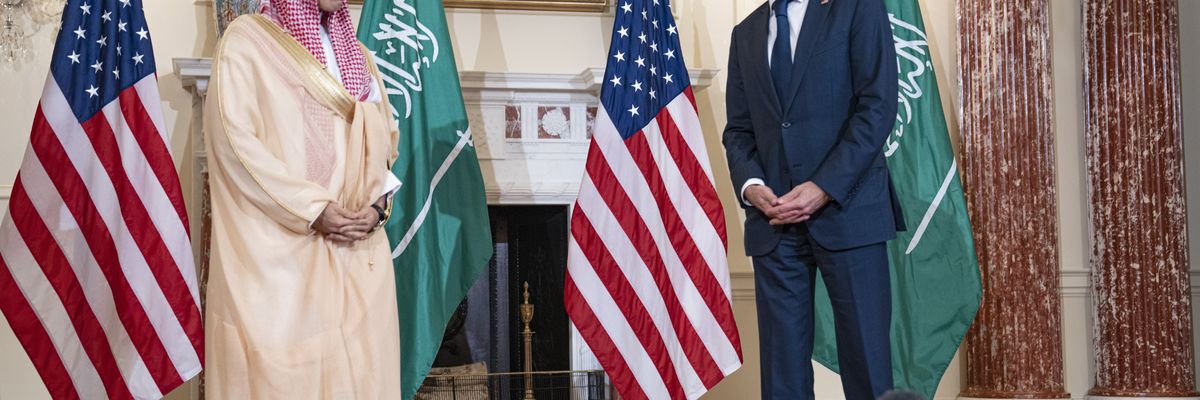A realignment of global relationships is underway, and that shift has become glaringly obvious in the days and weeks following Russia’s invasion of Ukraine. Democracies are bolstering other democracies and authoritarians are supporting other authoritarians.
In the Middle East, we’ve seen leaders refuse to follow in lock-step with United States and the West in response to the Russian invasion and refrain from ostracizing Putin. The various United Nations General Assembly votes on Russian aggression in recent days and weeks have served as a litmus test for the general direction in which America’s relationships are headed in the region.
One example of this is the outcome of the April 7 UNGA vote to suspend Russia from the U.N. Human Rights Council in which every country in the Middle East either abstained or opposed suspending Russia.
Additionally, there are reports that Saudi Arabia is considering accepting Chinese yuan in exchange for oil, threatening the dominance of the U.S. dollar as the only global reserve currency, and thereby undermining U.S. power globally. The Middle East’s now public embrace of Russia and China is both rational and probable.
Decisive U.S. and European actions and sanctions against Putin did not go unnoticed by regional regimes, which likely realize that this could happen to them one day if for any reason the West decides to take action against their rule. Those same regimes felt similarly during the Arab Spring when the Obama administration was not willing to condemn popular movements to depose long-time dictators, and allowed those movements to take their course.
Even though the Gulf monarchies emerged mostly unscathed from the Arab Spring, they fear the spread of popular movements throughout the region and therefore continue to bankroll anti-democratic movements and figures. The most significant example of this, is the Gulf’s support of Egyptian President Abdel Fattah el Sisi in the wake of the 2013 military coup, which overthrew Egypt’s first and only democratically elected president, Mohammed Morsi. Gulf states have spent tens of billions of dollars to prop-up el Sisi since 2013.
In addition to the U.S. position on the Arab Spring and the American willingness to wield crippling sanctions against a country like Russia that is admired by Arab leaders, the Gulf rift with the United States has deepened due to the U.S. refusal to become more deeply involved in the catastrophic Yemen war launched by Saudi Crown Prince Mohamed Bin Salman in 2015, as well as the U.S. commitment to renegotiating a nuclear deal with Iran.
While the United States continues to sell weapons to Saudi Arabia, President Biden has said that the U.S. will only deliver "defensive" weapons to protect against cross-border Houthi attacks on Saudi Arabia. While what is considered a defensive capability is somewhat nebulous, this policy has curbed some U.S. arms sales to Saudi Arabia, like for example, air to ground missiles.
The level of involvement that Saudi Arabia envisions for the United States in Yemen goes well beyond what the Biden administration is likely willing to provide. Perhaps having realized that the Biden administration is not going to get fully on board with its Yemen campaign — and with Congress potentially moving forward with another War Powers Resolution — the Saudis ramped up their diplomatic efforts in recent days and declared a unilateral two-month truce that appears to have stopped cross-border Houthi attacks, at least for the time being.
What Saudi Arabia, the UAE, and many in Washington view as a U.S. “abandonment” of its Gulf partners should actually be judged as a prudent U.S. decision to not join a devastating war of choice. Washington should not appease regional actors and should not undervalue the benefits the U.S. security umbrella has conferred not just on the Gulf, but for global trade and free-riders such as China who have benefitted greatly at no cost.
Despite decades of investment of American blood and treasure in the region, Arab leaders continue to view their relationships with the United States on a transactional basis, as these relationships from their inception were not founded on shared values. Rightsizing and rebalancing America’s regional relationships does not mean that it must cut ties and disengage. The United States should continue to cooperate with countries in the Middle East to the extent that interests align in certain areas. However, this should not be done at the expense of U.S. strategic interests.
In the wake of the Russian invasion of Ukraine, the West must rethink not just its military posture but its economic relationships with adversaries like China and Russia. The first step policy makers can take is to regain American energy and economic independence and help Europe untie itself — not just form the Russian energy sector, but from tethering itself to other problematic actors who can fill the gap.
In the short-term, this means increasing U.S. energy production from all possible sources, including for example extracting and exporting more liquified natural gas and incentivizing U.S. oil companies to ramp up production. In the medium to long-term this means focusing on significantly increasing solar, wind, and nuclear energy production so that cartels like OPEC+ can no longer hold the global economy hostage.
The second step is to aggressively pursue a foreign policy that emphasizes promoting U.S. interests, human rights, and democratic values while deepening partnerships with countries that share our values.
And finally, the United States should have an agile foreign policy, especially when dealing with adversaries and countries that do not share its values. The United States must accept the transactional nature of relationships with countries in the Middle East by fundamentally reassessing, rightsizing, and rebalancing U.S. foreign policy in the region, as well as being clear about U.S. expectations and obligations.
The views expressed in this article are those of the author and do not reflect the official policy or position of the U.S. Department of Defense or the U.S. government.















